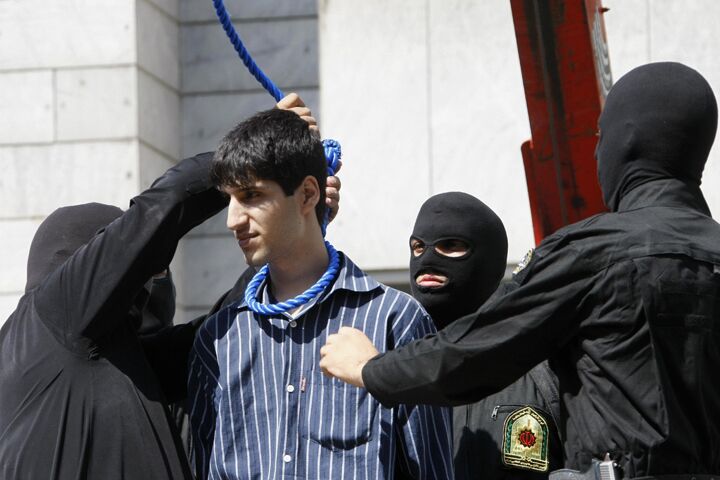
Iran Muzzles and Executes Dissenters Under Sharia Law
Frenzied shouts of “Allah akbar” (“Allah is great”) accompanied seven Iranians on their death walk Wednesday. Moments later, executioners kicked the stools supporting their weight out from beneath their feet, and cords around their necks cut their fall sickeningly short. Accompanying the victims’ final few spasmodic kicks, the crowd of onlookers and a mullah howled, “Alhamd li-Allah” (“Praise be to Allah”).
The hangings, broadcast live on Iranian public television, were the latest in the state’s crackdown on “hooligans.” The Farsi equivalent of “hooligans” is Tehran’s term for dissenters, activists or troublesome union leaders.
According to Iranian-born journalist Amir Taheri, the public executions ordered by Iranian President Mahmoud Ahmadinejad are part of a terror campaign to clamp down on an increasingly restive population. At least 118 people have been executed since the middle of June, including four who were put to death by stoning.
Amnesty International lists Iran as having one of the highest execution rates in the world, a standing that may soon increase. Iran’s chief Islamic prosecutor reports that 150 more people are scheduled to be hanged and stoned to death over the coming days and weeks. The current wave of executions is Iran’s highest in 23 years.
As part of Iran’s recent crackdown and program of intimidation, over 1 million people have been arrested since April, most for violating Islamic dress codes, including having hairstyles deemed to be too Western. The arrests included 430,000 men and women on charges of drug use, 6,204 on charges on “sexual proximity,” and just within the city of Tehran, 4,209 on charges of hooliganism. Last week, Iranian police raided an underground rock concert and detained more than 200 people.
The wave of arrests has sparked a massive prison boom, as government buildings are being converted into makeshift jails. Still, Ali-Akbar Yassaqi, the head of the National Prisons Service, isn’t sure if the new buildings will prove sufficient.
Though many who are arrested may only spend hours or days incarcerated, Iranian prisons are overflowing. Government statistics show official prison capacity at 50,000, while inmate levels in excess of 150,000 have led Yassaqi to appeal for a moratorium on arrests.
The national crackdown comes as Iran’s leaders attempt to cut Iranians off from outside media and focus attention on international threats and conspiracies.
Over 4,000 Internet sites have been blocked, with more added each day. The national book blacklist is growing too. Over the past four months, 30 newspapers and magazines have been closed, and 17 journalists jailed, two of whom are scheduled to be hung.
Additionally, 40 people have arrested on charges of spying. Iranian propaganda reached a dubious level recently when state-sponsored news agency irna announced that 14 squirrels carrying foreign-agency espionage gear had been captured.
The futility of the West trying to make peace with the radical leaders responsible for this massive wave of arrests and executions should be readily apparent. Ahmadinejad does not want peace; he wants Iranian-enforced Sharia law to cover the world. As Tehran’s leaders consolidate their hold on the country by brute force, expect Iran to become even more forceful in its foreign policy.
